
 i_need_contribute
i_need_contribute

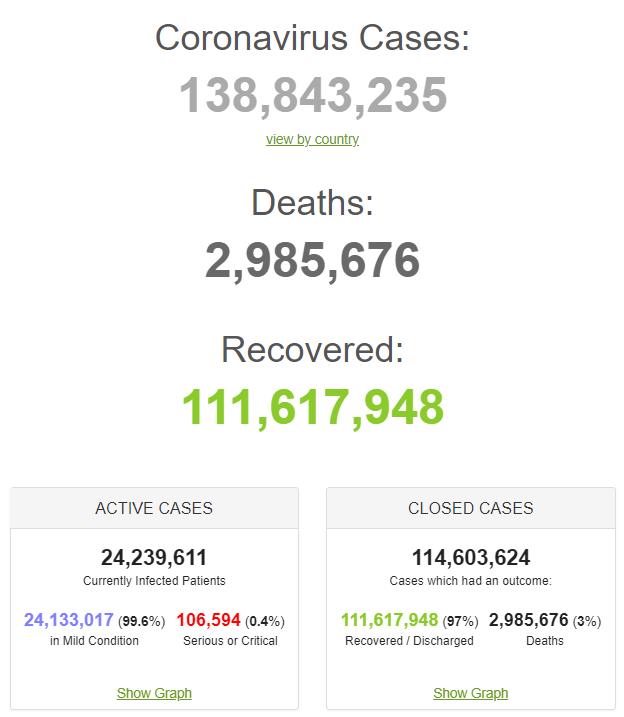
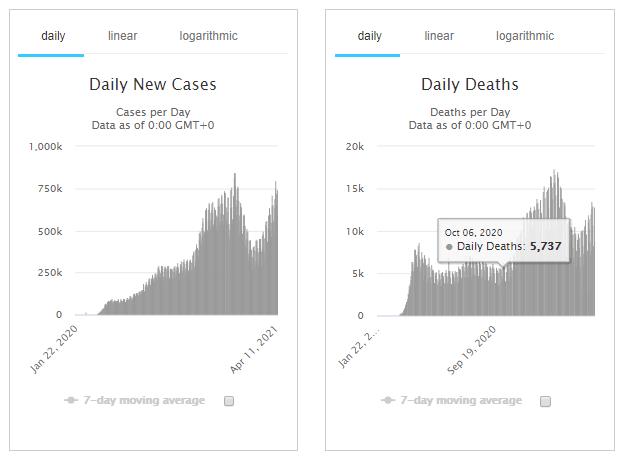
| Country, | Total | New | Total |
| Other | Cases | Cases | Deaths |
| World | 138,821,288 | 804,316 | 2,984,920 |
| USA | 32,149,223 | 78,439 | 578,092 |
| India | 14,070,890 | 199,569 | 173,152 |
| Brazil | 13,677,564 | 75,998 | 362,180 |
| France | 5,149,834 | 43,505 | 99,777 |
| Russia | 4,666,209 | 8,326 | 104,000 |
| UK | 4,378,305 | 2,491 | 127,161 |
| Turkey | 4,025,557 | 62,797 | 34,734 |
| Italy | 3,809,193 | 16,168 | 115,557 |
| Spain | 3,387,022 | 10,474 | 76,756 |
| Germany | 3,064,382 | 32,546 | 79,813 |
| Poland | 2,621,116 | 21,283 | 59,930 |
| Argentina | 2,604,157 | 25,157 | 58,542 |
| Colombia | 2,585,801 | 16,487 | 66,819 |
| Mexico | 2,286,133 | 4,293 | 210,294 |
| Iran | 2,143,794 | 25,582 | 65,359 |
| Ukraine | 1,887,338 | 14,553 | 38,225 |
| Peru | 1,667,737 | 8,030 | 55,812 |
| Czechia | 1,590,124 | 5,033 | 28,124 |
| Indonesia | 1,583,182 | 5,656 | 42,906 |
| South Africa | 1,561,559 | 1,599 | 53,498 |
| Netherlands | 1,369,411 | 5,386 | 16,848 |
| Chile | 1,094,267 | 5,557 | 24,548 |
| Canada | 1,087,152 | 8,590 | 23,445 |
| Romania | 1,016,449 | 4,076 | 25,605 |
| Iraq | 949,050 | 7,972 | 14,836 |
| Belgium | 930,603 | 3,374 | 23,566 |
| Philippines | 892,880 | 8,122 | 15,447 |
| Sweden | 885,385 | 13,720 | |
| Israel | 836,504 | 170 | 6,312 |
| Portugal | 828,857 | 684 | 16,931 |
| Pakistan | 734,423 | 4,503 | 15,754 |
| Hungary | 731,675 | 3,597 | 24,265 |
| Bangladesh | 703,170 | 5,185 | 9,987 |
| Jordan | 676,175 | 4,085 | 7,987 |
| Serbia | 651,899 | 3,154 | 5,846 |
| Switzerland | 627,968 | 2,601 | 10,488 |
| Austria | 584,205 | 2,942 | 9,779 |
| Japan | 512,169 | 3,367 | 9,469 |
| Morocco | 503,664 | 703 | 8,920 |
| Lebanon | 502,299 | 2,460 | 6,778 |
| UAE | 489,495 | 1,798 | 1,541 |
| Saudi Arabia | 401,157 | 929 | 6,781 |
| Bulgaria | 380,576 | 2,517 | 14,871 |
| Slovakia | 373,107 | 1,069 | 10,798 |
| Malaysia | 365,829 | 1,889 | 1,353 |
| Panama | 359,516 | 395 | 6,177 |
| Ecuador | 350,539 | 2,950 | 17,400 |
| Belarus | 338,801 | 1,166 | 2,383 |
| Greece | 304,184 | 3,081 | 9,135 |
| Croatia | 297,973 | 3,099 | 6,399 |
| Azerbaijan | 291,894 | 2,293 | 4,009 |
| Georgia | 291,214 | 1,085 | 3,901 |
| Bolivia | 284,183 | 1,099 | 12,496 |
| Nepal | 281,564 | 580 | 3,061 |
| Tunisia | 276,727 | 2,123 | 9,480 |
| Kazakhstan | 276,054 | 2,229 | 3,286 |
| Palestine | 274,690 | 1,923 | 2,923 |
| Dominican Republic | 259,260 | 623 | 3,402 |
| Kuwait | 251,675 | 1,402 | 1,423 |
| Moldova | 243,365 | 1,001 | 5,466 |
| Paraguay | 242,161 | 2,020 | 5,040 |
| Ireland | 242,105 | 421 | 4,812 |
| Denmark | 239,532 | 663 | 2,447 |
| Ethiopia | 234,405 | 1,893 | 3,252 |
| Lithuania | 229,260 | 1,284 | 3,718 |
| Slovenia | 229,076 | 1,233 | 4,135 |
| Costa Rica | 225,343 | 3,044 | |
| Egypt | 212,961 | 831 | 12,570 |
| Guatemala | 207,127 | 1,805 | 7,089 |
| Armenia | 205,128 | 1,075 | 3,794 |
| Honduras | 196,704 | 618 | 4,873 |
| Qatar | 192,963 | 984 | 348 |
| Bosnia and Herzegovina | 186,372 | 708 | 7,642 |
| Venezuela | 178,094 | 1,122 | 1,834 |
| Oman | 175,633 | 1,269 | 1,807 |
| Libya | 170,045 | 541 | 2,834 |
| Nigeria | 164,000 | 89 | 2,061 |
| Bahrain | 159,964 | 1,175 | 569 |
| Uruguay | 152,089 | 2,659 | 1,647 |
| Kenya | 148,128 | 981 | 2,420 |
| North Macedonia | 144,111 | 949 | 4,322 |
| Myanmar | 142,605 | 9 | 3,206 |
| Albania | 128,959 | 207 | 2,331 |
| Algeria | 118,975 | 176 | 3,141 |
| Estonia | 115,629 | 549 | 1,057 |
| S. Korea | 111,419 | 731 | 1,782 |
| Latvia | 109,088 | 733 | 2,019 |
| Norway | 105,607 | 599 | 706 |
| Sri Lanka | 95,719 | 99 | 602 |
| Montenegro | 94,859 | 216 | 1,405 |
| Ghana | 91,477 | 67 | 763 |
| Kyrgyzstan | 90,839 | 240 | 1,534 |
| China | 90,447 | 12 | 4,636 |
| Zambia | 90,389 | 171 | 1,229 |
| Cuba | 89,404 | 959 | 487 |
| Uzbekistan | 85,503 | 212 | 634 |
| Finland | 82,964 | 400 | 881 |
| Mozambique | 68,927 | 56 | 794 |
| El Salvador | 66,816 | 159 | 2,057 |
| Luxembourg | 64,334 | 272 | 784 |
Retrieved from: https://www.worldometers.info/coronavirus/
From CNN's Jacob Lev
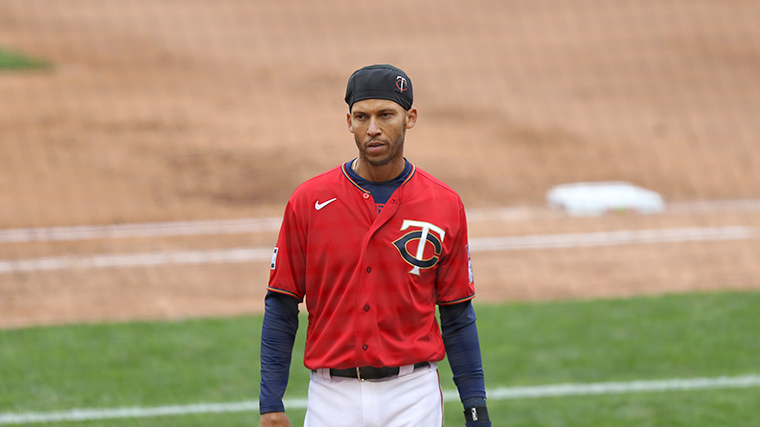
Minnesota Twins' Andrelton Simmons seen during a baseball game against the Seattle Mariners, Saturday, April 10, in Minneapolis. Stacy Bengs/AP/FILE
Major League Baseball's Minnesota Twins shortstop Andrelton Simmons has tested positive for Covid-19 after refusing to be vaccinated against the virus.
In late March, Simmons said in a tweet, he would not be getting or advocating for the vaccine due to "personal reasons and past experience."
Simmons is currently experiencing "very mild symptoms" and is resting comfortably at home, according to the Twins' president of baseball operations Derek Falvey.
"We want to continue to educate people in the environment. This is real. This is something that can enter. We know that," Falvey said on Wednesday. “Sometimes no one really knows exactly how it can come at different times. We know that from looking not just across our sport, but across all sports and across the country and the world. Our view of that is constantly reminding people of why we think it's a good idea to get vaccinated. Our docs have recommended that, and so we continue to provide them as resources to players, to learn as much as they can about this."
Simmons was notified of the positive test after Tuesday's game against the Boston Red Sox and was placed on the Covid-19 protocol list before Wednesday's doubleheader against the Red Sox.
Falvey added, "We're not out of the woods by any means on that front. Now is the time to be as vigilant as possible."
From CNN’s Maggie Fox
Some patients who developed blood clots after receiving a Johnson & Johnson coronavirus vaccine received the wrong treatment at first, a company representative told an emergency meeting of federal vaccine advisers Wednesday.
The Advisory Committee on Immunization Practices, which advises the US Centers for Disease Control and Prevention on vaccine issues, heard details of the six known cases of rare blood clots among about seven million people who got the vaccine in the US, plus a seventh suspected case.
At least four of the six cases were treated with heparin when they first developed symptoms, Dr. Aran Maree, chief medical officer for pharmaceuticals at J&J’s Janssen vaccine arm, told the meeting.
He gave details of what’s known about the cases, which include: a 45-year-old woman who died; a 38-year-old woman who has not recovered; an 18-year-old woman who has not recovered; a 48-year-old woman who has not recovered, a 26-year-old woman who has recovered and a 28-year-old woman whose status is unknown. They also include a possible seventh case – a 59-year old woman who has not yet recovered and whose blood clots might not fit the same profile as the others.
Heparin is not the recommended treatment for this particular type of rare blood clot, which is accompanied by a low level of a blood clotting cell known as platelets. Heparin is a blood thinner and giving it to people with low platelet counts could cause hemorrhaging.
From CNN’s Zahra Ullah and Anna Chernova in Moscow

Russian President Vladimir Putin in Moscow on April 13. Mikhail Metzel/TASS/Getty Images
Russian President Russian Vladimir Putin says he received his second shot of a Covid-19 vaccine on Wednesday.
“Right now, just before entering this room, I also got the second vaccination [shot],” Putin said during a live videoconference at a meeting of the Board of Trustees of the Russian Geographical Society.
Putin also expressed hope that the pandemic will soon subside and encouraged the public to follow his lead in taking up the vaccine.
“I hope that everything will be okay. Not even hoping - I'm sure of it. And [I] wish you the same, based on the fact that you, taking care of your close ones, will do the same and will follow my lead,” Putin said.
On March 23, the Russian leader received his first shot of the Covid-19 vaccine without releasing any images or video of the process -- or revealing which vaccine he had taken.
The Kremlin said at the time that the type of vaccine that was used would not be publicized, but said that it was one of the approved Russian vaccines.
Russia became the first country in the world to approve a Covid-19 vaccine in August 2020 when it authorized the use of its homegrown vaccine, Sputnik V.
https://www.cnn.com/world/live-news/coronavirus-pandemic-vaccine-updates-04-14-21/index.html

Registering for a dose of the Pfizer BioNTech vaccine at the Parc des Expositions in Angers, France, on Tuesday.Credit...Stephane Mahe/Reuters
The European Union will receive an extra 50 million doses this month of the coronavirus vaccine developed by Pfizer and BioNTech, a lift in its effort to speed up inoculations in the face of difficulties with vaccines developed by AstraZeneca and Johnson & Johnson.
The announcement by Ursula von der Leyen, the president of the European Commission, is part of the European Union’s hard pivot to mRNA vaccines such as Pfizer’s, staking its future coronavirus response on them.
The moves come a day after Johnson & Johnson suspended the rollout of its vaccine in the European Union and as the bloc continued to suffer the fallout from restrictions on the AstraZeneca vaccine, after reports of extremely rare but serious potential side effects from both.
The 27-nation bloc has also entered negotiations with Pfizer over the supply of 1.8 billion new vaccine doses — including booster shots to prolong immunity and new vaccines to tackle emerging variants — in 2022 and 2023, Ms. von der Leyen said.
In another setback for AstraZeneca, Denmark on Wednesday became the first country to permanently stop the administration of the company’s vaccine, saying the potential side effects were significant enough to do so given that it had the pandemic under control and could rely on two other vaccines, from Pfizer and Moderna.
The European Union has not canceled its existing orders of the AstraZeneca and Johnson & Johnson vaccines, but signaled it was not going to be placing more.
The European Medicines Agency, the bloc’s top drug regulator, continues to say that for most people the benefits of the AstraZeneca vaccine far outweigh the risks of a dangerous, but extremely rare, blood disorder. On Wednesday, the agency said it was expediting its investigation of “very rare cases of unusual blood clots” in recipients of the Johnson & Johnson vaccine, and expected to issue a recommendation next week.
While the evaluation is ongoing, the agency reiterated its view that the benefits of that vaccine also outweigh the risks.
The European Union’s turn away from AstraZeneca follows difficult months in which relations between the company and the bloc deteriorated over delayed shipments and unpredictable supply. And since then, concerns over the possible side effects have exacerbated vaccine skepticism that was already dangerously high in Europe.
Those problems have contributed to Europe’s falling seriously behind vaccination campaigns in the United States and Britain. The bloc is hoping the new Pfizer shipments will help it begin to catch up and to meet its goal to fully vaccinate 70 percent of its adult population by the end of the summer, some 255 million people.
Pfizer’s commitment to bring forward the delivery of the 50 million doses, which were originally slated for the end of the year, means the company will deliver a total of 250 million doses to the bloc by the end of June.
“We need to focus now on technologies that have proven their worth: mRNA vaccines are a clear case in point,” Ms. von der Leyen said.
https://www.nytimes.com/2021/04/14/world/pfizer-europe-coronavirus-vaccine.html

Health workers prepare to test a patient for coronavirus in Elandsdoorn, South Africa.Credit...Jerome Delay/Associated Press
South Africa has faced blow after blow to its pandemic-control efforts: A worrisome variant swept across the country, driving a devastating second wave of coronavirus cases. Then officials had to scramble for an alternative when the vaccine it had bet on, from AstraZeneca, proved ineffective against the variant, which can partially dodge the body’s immune system response.
Now the alternative — Johnson & Johnson’s single-dose vaccine, the only one now in use in South Africa — has run into trouble as well, over concerns of rare blood clots that emerged in a handful of people in the United States who had received the shot. It is unclear whether the vaccine is responsible.
South Africa’s health minister, Dr. Zwelini Mkhize, announced on Tuesday that the country would temporarily halt its vaccine program for medical workers, which has inoculated around 290,000 people so far. Dr. Mkhize said he expected the program — a clinical trial — to resume in a few days, after the authorities have had a chance to look into the blood clot cases in the United States.
“Science must be respected at all times, although this may mean a disruption in our plans,” Dr. Mkhize said on Tuesday.
In an emergency meeting on Wednesday, a panel of experts advising the C.D.C. on the issue of the blood clots asked for more time to assess the data and risks involved in the use of the Johnson & Johnson vaccine. They said they would not vote on a recommendation until they meet again in a week or 10 days.
South African health authorities have been gearing up to extend vaccinations to the general public starting in May. That program relies on 30 million doses of the Johnson & Johnson vaccine and 30 million of the two-shot Pfizer-BioNTech vaccine, which South African officials recently secured.
The country halted use of the AstraZeneca vaccine after evidence emerged that it did not protect clinical-trial participants from becoming mildly or moderately ill from the variant, known as B.1.351, that is now dominant in the country. South African authorities then pivoted to the Johnson & Johnson vaccine, which is manufactured in the country under license and has a 64 percent efficacy rate in South Africa, according to an analysis by the U.S. Food and Drug Administration.
Health experts say that the decision on Tuesday to pause vaccinating health care workers is the kind of thing that happens often in clinical trials, and that it probably won’t have any major implications for vaccinating the general public.
“At the moment, there is nothing to indicate that this will delay the national rollout program,” said Dr. Richard Lessells, an infectious diseases specialist at the KwaZulu-Natal Research and Innovation Sequencing Platform.
Even so, if evidence emerges to implicate the Johnson & Johnson vaccine in blood clotting problem, and health officials begin to question its safety, it could be a devastating blow for South Africa, the African country hardest hit by the coronavirus, as it races to inoculate its population before an even more dangerous variant appears.
“The U.S. has access to other vaccines to fill a gap, in terms of not using the Johnson & Johnson vaccine,” said Shabir Madhi, a virologist at University of the Witwatersrand who ran the AstraZeneca vaccine trial in South Africa. “That sort of luxury doesn’t exist in other countries, including South Africa.”
https://www.nytimes.com/live/2021/04/14/world/covid-vaccine-coronavirus-cases?name=styln-vaccines-combo®ion=TOP_BANNER&block=storyline_menu_recirc&action=click&pgtype=Article&variant=1_Show&is_new=false#south-africa-covid-vaccine
Doctors speak of a new variant of the virus that appears to be spreading faster than ever before
Dr K Senthil had feared it was coming.
He had feared it as he saw the reckless crush of hundreds of people taking part in large wedding parties over the past months, feared it as he saw the maskless faces of shoppers at the market, feared it as he witnessed thousands come together for political rallies in the ongoing elections in the Indian state of Tamil Nadu, where he is the president of the state medical council.
But despite his growing sense of foreboding, the second wave of coronavirus that began to engulf India last month has confounded even Senthil’s worst expectations.
“People became so complacent, acting as if the virus had vanished which was absurd,” said Senthil, who is a urologist in Coimbatore, Tamil Nadu.
“Now we are experiencing a wave of coronavirus infections that is far worse than the first and the magnitude of the spread is getting worse and worse. In Tamil Nadu it has taken just 15 days to reach the same level of cases in hospitals which was the peak last time. In the big cities in the state, the hospitals are already almost full.”
This week has marked a series of grim Covid milestones for India. It was this week the country once again outstripped Brazil to become the second-worst affected globally, with a total of over 13.68m cases. Each day has brought a new record for new infections; on Tuesday, the figure was 161,736. Active cases also hit a new high, while deaths continued to escalate to a total of over 171,000.
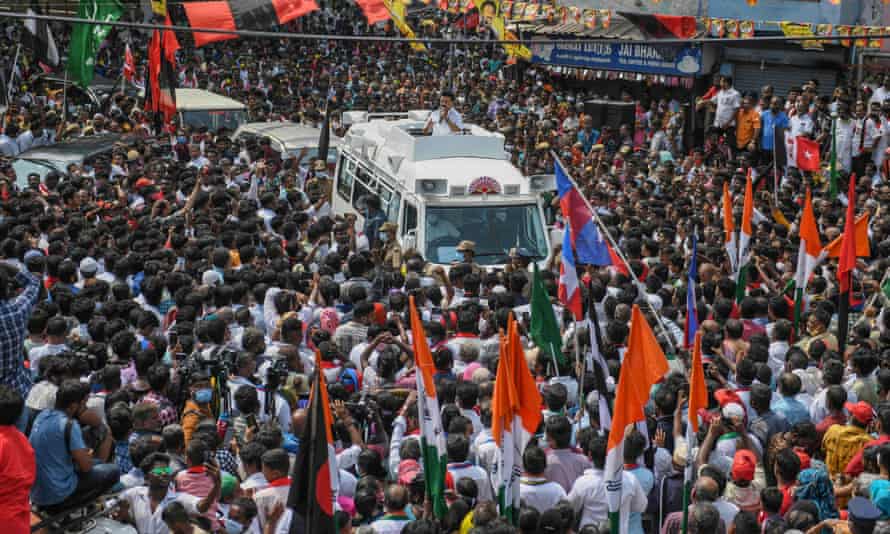
Thousands come together for election campaign rallies ahead of the elections, like this one in Chennai on 4 AprilPhotograph: Arun Sankar/AFP/Getty Images
Nightmare scenes of a country struggling to cope have begun to emerge as doctors speak of a new variant of the virus that appears to be spreading faster than ever before, affecting young people and even children this time around and pushing India’s healthcare system to the brink of collapse. States such as Maharashtra have imposed a weekend lockdown in an attempt to curb infections, while Delhi has introduced a night curfew, with a total lockdown still not ruled out.
Over the weekend bodies piled up outside the government hospital in Raipur, in the state of Chhattisgarh, because the hospital had “not expected so many people to die at once” from coronavirus and could not cremate them fast enough. In Surat, in the state of Gujarat, crematoriums became so overwhelmed with coronavirus victims that families began burning their dead on open ground.
“This sheer tsunami of cases has already overwhelmed the healthcare infrastructure in the state,” said Dr Shashank Joshi, a member of the Mumbai Covid taskforce. “This time we are seeing younger people between 20 and 40 getting seriously affected and even children are now being hospitalised with severe symptoms. The capacity for the healthcare system to hold on is fast dwindling.”
Kshitij Thakur, a local politician in the Vasai-Virar municipality of Maharashtra, made a desperate public plea for help with an “acute” shortage of oxygen in the local government hospital, which had already led to the loss of three lives.
“The supply can run for only three hours,” said Thakur in a tweet directed at the central government and prime minister Narendra Modi. “There are more than 7,000 active cases in the area and more than 3,000 people require oxygen supply daily.”
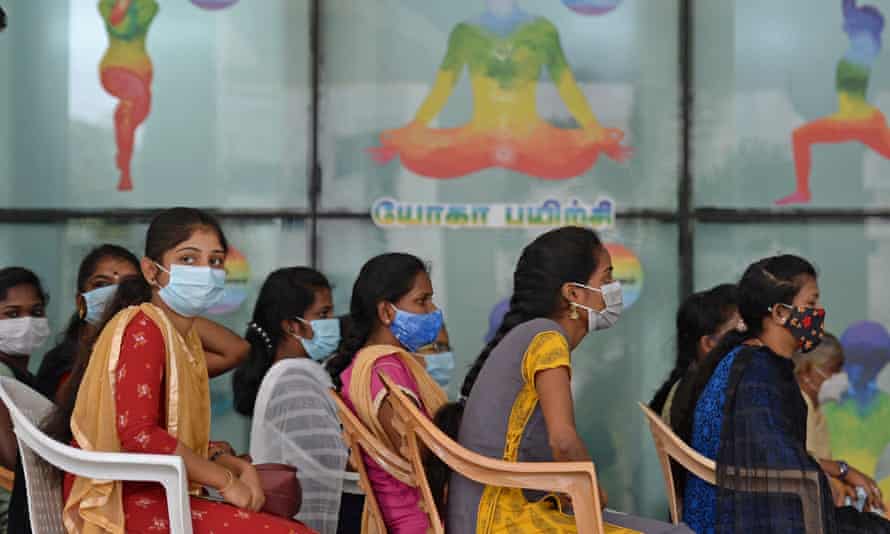
Young frontline workers wait to get vaccinated at a government hospital in Chennai Photograph: Arun Sankar/AFP/Getty Images
Though over 108 million people have been vaccinated so far, in a country of 1.3bn it has not been enough to curb the second wave. On Tuesday, the drugs controller general of India (DCGI), Dr VG Somani, approved the Russian Covid-19 vaccine, Sputnik V, for emergency use in India, with distribution likely to begin next month, and also cleared the way for Pfizer, Moderna and Johnson & Johnson to be given approval.
Just a month ago, while Europe grappled with soaring cases and stringent lockdowns, there was a widespread belief across India that the country had avoided the spectre of a second wave through a combination of herd immunity from the first wave, which eased off around November, and a speculated natural immune resistance among Indians.
In January, health minister Harsh Vardhan proclaimed that India had “successfully contained the pandemic”. Caps were lifted on social and religious gatherings, including the Kumbh Mela, a Hindu festival which on Monday drew crowds of over a million. Several populous states held their elections over the past month, with prime minister Modi and home minister Amit Shah among those holding political rallies where thousands gathered without social distancing or masks enforced. All three states are now experiencing a sharp rise in cases.
Much of the blame for the second wave has been attributed to complacency, but an increasing body of evidence, backed up by first-hand accounts from doctors on the frontline, also points to possible new variants in India which are proving to be drastically more infectious.
“The rate at which cases have increased in this wave far exceeds the rate at which cases grew the first time,” said Gautam Menon, professor of physics and biology at Ashoka University. “There is certainly evidence that it is spreading faster, suggesting that it is likely more infectious.”
Menon believed it was “new variants driving this rapid increase”, in particular an Indian variant known as B.1.617, which contains two mutations which are associated with increased infectivity and “immune escape”. Menon pointed to data from Maharashtra, the Indian state worst affected by Covid-19, where this variant has been found to be responsible for 20% of the cases.
The government has been accused of being slow in genome sequencing of Covid cases in India over the past few months and therefore failing to detect new and possibly more virulent domestic variants, as well as the virulent Brazil and UK variants. In the state of Punjab which is experiencing a severe rise in case, 80% have been found to be the UK variant.
Menon said that it was unlikely that a second wave in India could have been avoided altogether. “However, a more robust sequencing program should have acted as an early warning system, picking up the new variants of concern at an earlier stage,” he said. “This would have helped to slow down, if not actually stop, the spread.”
... we have a small favour to ask. You’ve read
17 articles
in the last year. And you’re not alone; through these turbulent and challenging times, millions rely on the Guardian for independent journalism that stands for truth and integrity. Readers chose to support us financially more than 1.5 million times in 2020, joining existing supporters in 180 countries.
With your help, we will continue to provide high-impact reporting that can counter misinformation and offer an authoritative, trustworthy source of news for everyone. With no shareholders or billionaire owner, we set our own agenda and provide truth-seeking journalism that’s free from commercial and political influence. When it’s never mattered more, we can investigate and challenge without fear or favour.
Unlike many others, we have maintained our choice: to keep Guardian journalism open for all readers, regardless of where they live or what they can afford to pay. We do this because we believe in information equality, where everyone deserves to read accurate news and thoughtful analysis. Greater numbers of people are staying well-informed on world events, and being inspired to take meaningful action.
We aim to offer readers a comprehensive, international perspective on critical events shaping our world – from the Black Lives Matter movement, to the new American administration, Brexit, and the world's slow emergence from a global pandemic. We are committed to upholding our reputation for urgent, powerful reporting on the climate emergency, and made the decision to reject advertising from fossil fuel companies, divest from the oil and gas industries, and set a course to achieve net zero emissions by 2030.
https://www.theguardian.com/world/2021/apr/14/a-tsunami-of-cases-desperation-as-covid-second-wave-batters-india